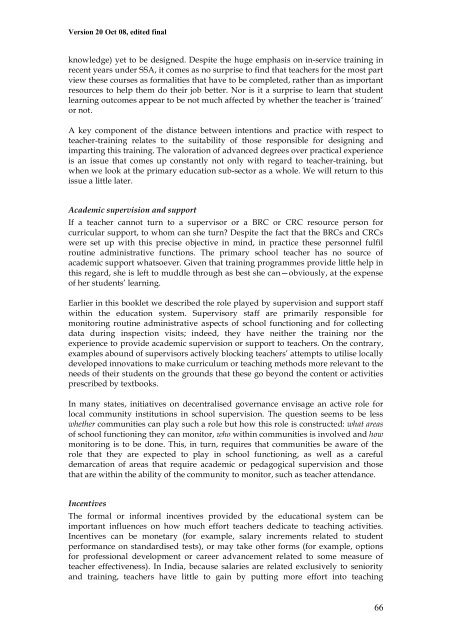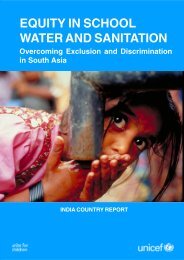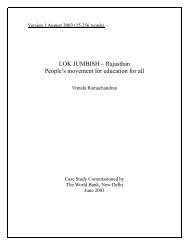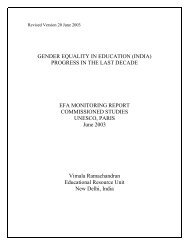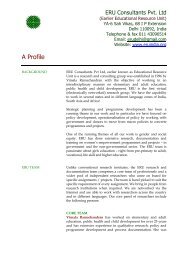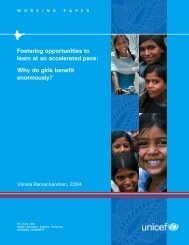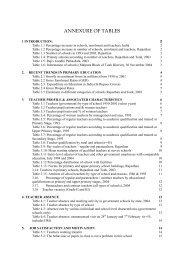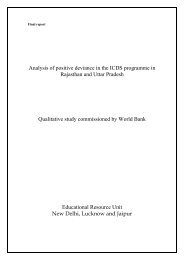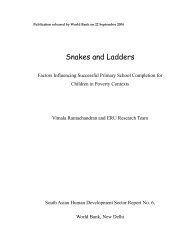primary school teachers the twists and turns of everyday practice
primary school teachers the twists and turns of everyday practice
primary school teachers the twists and turns of everyday practice
Create successful ePaper yourself
Turn your PDF publications into a flip-book with our unique Google optimized e-Paper software.
Version 20 Oct 08, edited final<br />
knowledge) yet to be designed. Despite <strong>the</strong> huge emphasis on in-service training in<br />
recent years under SSA, it comes as no surprise to find that <strong>teachers</strong> for <strong>the</strong> most part<br />
view <strong>the</strong>se courses as formalities that have to be completed, ra<strong>the</strong>r than as important<br />
resources to help <strong>the</strong>m do <strong>the</strong>ir job better. Nor is it a surprise to learn that student<br />
learning outcomes appear to be not much affected by whe<strong>the</strong>r <strong>the</strong> teacher is ‘trained’<br />
or not.<br />
A key component <strong>of</strong> <strong>the</strong> distance between intentions <strong>and</strong> <strong>practice</strong> with respect to<br />
teacher-training relates to <strong>the</strong> suitability <strong>of</strong> those responsible for designing <strong>and</strong><br />
imparting this training. The valoration <strong>of</strong> advanced degrees over practical experience<br />
is an issue that comes up constantly not only with regard to teacher-training, but<br />
when we look at <strong>the</strong> <strong>primary</strong> education sub-sector as a whole. We will return to this<br />
issue a little later.<br />
Academic supervision <strong>and</strong> support<br />
If a teacher cannot turn to a supervisor or a BRC or CRC resource person for<br />
curricular support, to whom can she turn? Despite <strong>the</strong> fact that <strong>the</strong> BRCs <strong>and</strong> CRCs<br />
were set up with this precise objective in mind, in <strong>practice</strong> <strong>the</strong>se personnel fulfil<br />
routine administrative functions. The <strong>primary</strong> <strong>school</strong> teacher has no source <strong>of</strong><br />
academic support whatsoever. Given that training programmes provide little help in<br />
this regard, she is left to muddle through as best she can—obviously, at <strong>the</strong> expense<br />
<strong>of</strong> her students’ learning.<br />
Earlier in this booklet we described <strong>the</strong> role played by supervision <strong>and</strong> support staff<br />
within <strong>the</strong> education system. Supervisory staff are primarily responsible for<br />
monitoring routine administrative aspects <strong>of</strong> <strong>school</strong> functioning <strong>and</strong> for collecting<br />
data during inspection visits; indeed, <strong>the</strong>y have nei<strong>the</strong>r <strong>the</strong> training nor <strong>the</strong><br />
experience to provide academic supervision or support to <strong>teachers</strong>. On <strong>the</strong> contrary,<br />
examples abound <strong>of</strong> supervisors actively blocking <strong>teachers</strong>’ attempts to utilise locally<br />
developed innovations to make curriculum or teaching methods more relevant to <strong>the</strong><br />
needs <strong>of</strong> <strong>the</strong>ir students on <strong>the</strong> grounds that <strong>the</strong>se go beyond <strong>the</strong> content or activities<br />
prescribed by textbooks.<br />
In many states, initiatives on decentralised governance envisage an active role for<br />
local community institutions in <strong>school</strong> supervision. The question seems to be less<br />
whe<strong>the</strong>r communities can play such a role but how this role is constructed: what areas<br />
<strong>of</strong> <strong>school</strong> functioning <strong>the</strong>y can monitor, who within communities is involved <strong>and</strong> how<br />
monitoring is to be done. This, in turn, requires that communities be aware <strong>of</strong> <strong>the</strong><br />
role that <strong>the</strong>y are expected to play in <strong>school</strong> functioning, as well as a careful<br />
demarcation <strong>of</strong> areas that require academic or pedagogical supervision <strong>and</strong> those<br />
that are within <strong>the</strong> ability <strong>of</strong> <strong>the</strong> community to monitor, such as teacher attendance.<br />
Incentives<br />
The formal or informal incentives provided by <strong>the</strong> educational system can be<br />
important influences on how much effort <strong>teachers</strong> dedicate to teaching activities.<br />
Incentives can be monetary (for example, salary increments related to student<br />
performance on st<strong>and</strong>ardised tests), or may take o<strong>the</strong>r forms (for example, options<br />
for pr<strong>of</strong>essional development or career advancement related to some measure <strong>of</strong><br />
teacher effectiveness). In India, because salaries are related exclusively to seniority<br />
<strong>and</strong> training, <strong>teachers</strong> have little to gain by putting more effort into teaching<br />
66


